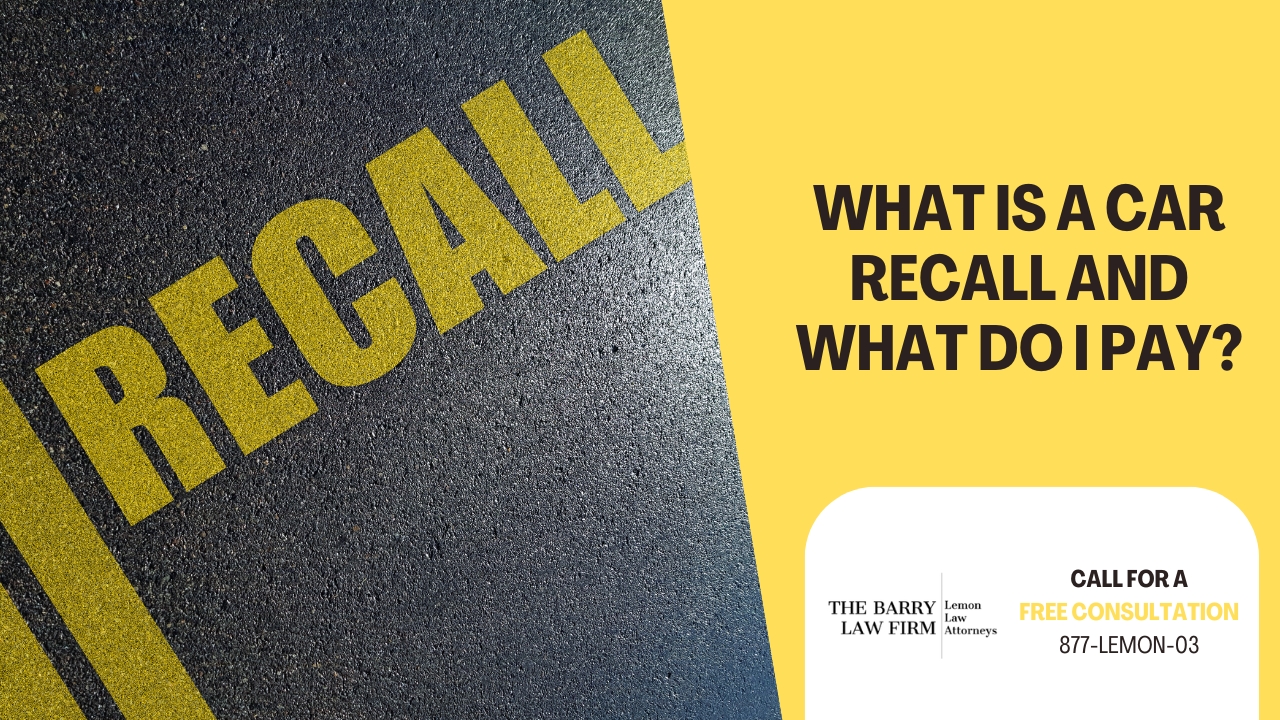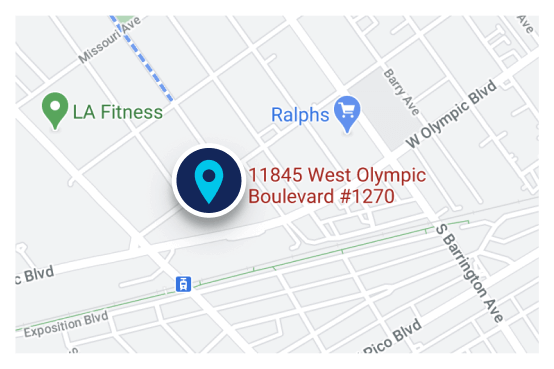
A car owner who learns that their vehicle is the subject of a safety recall may feel vindicated if they have been dealing with ongoing problems. But if you’ve been considering a claim under California’s Lemon Law protections for owners of faulty motor vehicles, you may wonder how a recall impacts your case.
Every year, thousands of cars are recalled to address safety defects and other issues. If you receive a recall notice about a vehicle you own, you should review it carefully and follow its recommendations, including contacting a local authorized dealership or the manufacturer to schedule repairs.
If your vehicle qualifies as a lemon, you have the right to demand that the manufacturer buy the vehicle back from you. Usually, a safety recall will strengthen your Lemon Law buyback claim.
The Barry Law Firm can help you assess and pursue a California Lemon Law buyback — with or without a vehicle recall affecting your car. Our firm focuses its practice solely on Lemon Law claims and has secured fair compensation in Lemon Law buybacks for thousands of clients from across California since 2010. We pursue California Lemon Law claims at no charge to our clients because the law requires auto manufacturers to pay the consumer’s legal fees in successful claims.
If you’re dealing with a faulty motor vehicle that’s still covered by the manufacturer’s original warranty in California, contact The Barry Law Firm in Los Angeles today for a fast and free consultation.
What Exactly Is a Vehicle Recall & Why Do They Happen?
A vehicle recall is a notice issued by the manufacturer or federal government to explain that a problem with a vehicle has been identified and recommend steps to remedy the situation. In most cases, the solution is to obtain repairs at the dealership where the car was purchased. The issue may involve vehicles, tires, or equipment that create a safety risk or do not meet minimum safety standards. An auto manufacturer or the National Highway Traffic Safety Administration (NHTSA) will typically notify affected owners of a recall campaign by mail.
An auto recall may also advise against continuing to drive an affected vehicle or name other actions to avoid. For example, some safety recalls of high-voltage battery packs used in electric and hybrid vehicles have advised against parking recalled vehicles in garages or near structures due to the fire risk.
A safety recall may be triggered if an auto manufacturer’s internal investigation reveals defects in its vehicles, it receives multiple consumer complaints, or NHTSA notifies the manufacturer of complaints. NHTSA will issue a safety recall if it gets enough complaints about a specific defect and the manufacturer fails to act. However, NHTSA says that most manufacturers voluntarily decide to issue recalls and provide solutions for safety defects before the agency gets involved.
What Happens When a Car Is Recalled?
A recall notice mailed to affected car owners will explain:
- The safety defect that has been identified
- What specific vehicles are affected, including the make, model, year, number of vehicles, and sometimes vehicle identification numbers (VIN)
- Risks associated with the defect, such as loss of vehicle control, crash, and injury
- Potential warning signs that the car is affected by the defect
- Necessary repairs, which may range from updating software to replacing a part, repairing a component system, or rarely, replacing the vehicle
- A recall timeframe identifying when local dealerships will be ready to make repairs
A car recall letter may ask affected vehicle owners to schedule a repair at their local dealership. Automotive safety recalls do not expire, but you should respond to a recall notice in a timely manner.
NHTSA monitors the effectiveness and management of recalls, including the filing of recall notices with NHTSA, communication with car owners about recalls, and the rate of compliance with each recall.
Are Recall Repairs Free?
You should never have to pay for parts, labor, or any other costs associated with a recall repair. Federal law requires the manufacturer to cover the repair costs related to a vehicle recall. The law even requires auto manufacturers to reimburse car owners for the cost of repairs they obtained before the manufacturer or NHTSA issued a recall for the same defect.
The manufacturer should provide necessary parts and instructions to its dealerships. The manufacturer typically reimburses its dealerships for their labor costs, as well.
What Is the Difference Between a Recall and a Lemon?
Although they can both severely affect your vehicle, a recall and a lemon are two very different things:
- Recall – A car recall is the manufacturer’s notice of a process to repair a substantial safety defect or some other problem in an automobile it makes.
- Lemon – California law defines a vehicle as a lemon if it has a substantial defect covered by the manufacturer’s original warranty that persists despite a reasonable number of attempts by the manufacturer to repair it.
In most cases, the car manufacturer determines what’s necessary to repair a defect before issuing a recall notice. The dealership should be able to resolve the problem for each car owner who responds to the recall. However, in some cases, a vehicle defect subject to recall cannot be fixed. When that happens, the recalled car owners may have legal options under the state’s Lemon Law.
When Can a Recall Make a Car a Lemon?
The fact that a vehicle has been the subject of a recall does not automatically mean it is a lemon. However, if the issue that prompted a recall cannot be repaired, the owner may be able to pursue a Lemon Law claim.
Not all defects qualify under the law, though. It must be a substantial defect that negatively affects the car’s safety, use, or value. The defect must also be covered under the manufacturer’s original written warranty and remain unresolved after the manufacturer’s reasonable number of repair attempts.
What’s considered a “reasonable number” of repair attempts under California Lemon Law can vary from case to case. If the defect poses a significant danger, two or more attempts to fix the problem are typically considered reasonable. Manufacturers may be entitled to more than two attempts to fix less severe issues. In certain circumstances, a vehicle may automatically qualify as a lemon if it is out of service for an inordinate amount of time.
In a California Lemon Law buyback, the car owner or lessee can pursue the full cost of their:
- Purchase or lease price, including the down payment, monthly payments made, and the remaining balance of the car loan
- Collateral charges, including sales or use taxes, license and registration fees, and other governmental fees
- Incidental costs, including repairs, towing, or rental cars and other alternative transportation
- Attorney’s fees and costs, as required by California’s Lemon Law
How Can a Recall Affect My Lemon Law Claim?
While a recall does not make a vehicle a lemon, it is solid evidence that the manufacturer knows that make and model of vehicle has a significant safety issue. It indicates that the problem is severe enough for the manufacturer to ask every owner it could contact to seek repairs.
To fight a Lemon Law claim, a manufacturer will often argue that its dealership has been unable to duplicate the problem the car owner is complaining about or that the issue is not significant enough to warrant a buyback. But if the problem that makes your car a lemon has also led to a recall, the manufacturer cannot genuinely deny its existence or substance.
What Can a Lemon Law Attorney Do for My Recall Issue?
If you receive a recall notice about a car you own or lease, you should follow its instructions for obtaining repairs. If those repairs are not effective after several attempts and the problem is covered by the manufacturer’s original warranty, you should contact a Lemon Law attorney.
An attorney from The Barry Law Firm can help you pursue a Lemon Law buyback if your vehicle qualifies under California law. Our team provides aggressive advocacy, demanding accountability from large auto manufacturers when they make defective vehicles.
We manage Lemon Law claims from start to finish at no charge to our clients. We can help you compile all of the records required for a successful Lemon Law claim, document your vehicle’s ongoing problems and your full costs and losses, and press your vehicle’s manufacturer to make full restitution to you. If necessary, we will also be prepared to take a strong and persuasive case to court.
Call or reach out online today for a FAST & FREE consultation about a Lemon Law claim. And remember — the auto manufacturer pays the consumer’s legal fees after a successful claim. That means you’ll never be billed by The Barry Law Firm, no matter the outcome of your case. Contact us now to learn more!



